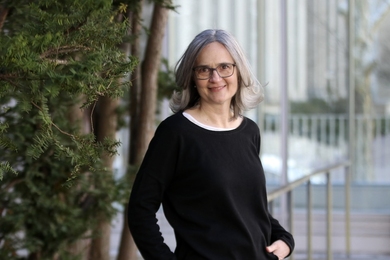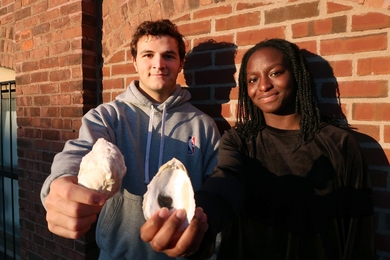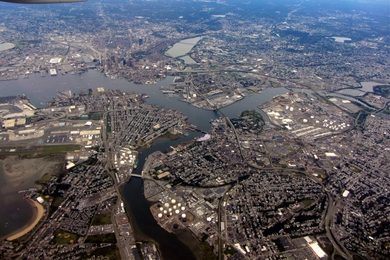BOSTON--Greater Boston's eight research universities-magnets for talent and billions of dollars in investment-will play a key role in the region's economic recovery by continuing to expand knowledge and technology that creates new industries and jobs, according to a study released today.
"Engines of Economic Growth" is a detailed report on the economic and social impact in 2000 and 2002 of Boston College, Boston University, Brandeis University, Harvard University, Massachusetts Institute of Technology, Northeastern University, Tufts University and University of Massachusetts Boston
In the year 2000 alone, the study found that the eight universities provided:
- a $7.4 billion boost to the regional economy;
- work for 48,750 university employees and 37,000 other workers in the region, who pay millions of dollars in federal, state and local taxes;
- a talent pool of more than 31,900 graduates, many of whom stay in Boston;
- innovative research that resulted in 264 patents, 280 commercial licenses of technology, and 41 start-up companies;
- continuing education for 25,000 non-degree students;
- numerous programs to help local K-12 schools and individual students;
- many community cultural events, such as concerts, plays and lectures;
- community improvements through construction of housing, streets, and increases in environmental benefits.
"Greater Boston's eight research universities," said its leaders in an introduction to a 12-page Report Summary, "are the region's special advantage: an enduring and stable economic engine, constantly changing and developing as new knowledge is gained and new technologies and industries are created.
"Collectively, our eight institutions are developers and employers of talent, incubators of business and industry, storehouses of cultural resources, research centers, purchasers, economic magnets, and community partners committed to our state and local governments.
"In the knowledge economy of the 21st Century, our universities can maintain their role as generators of economic growth and jobs only as they go into new fields and continue to grow. We are committed to our essential role in assisting the Commonwealth's economic recovery."
The letter was signed by William Leahy, president of Boston College; John Silber, chancellor of Boston University; Jehuda Reinharz, president of Brandeis University; Lawrence H. Summers, president of Harvard University; Charles M. Vest, president of Massachusetts Institute of Technology; Richard M. Freeland, president of Northeastern University; Lawrence S. Bacow, president of Tufts University; and Jo Ann M. Gora, chancellor of University of Massachusetts Boston.
The report noted that the main campuses of these universities are all within a nine-mile radius of Beacon Hill and the state capitol.
"One of the greatest economic strengths of Massachusetts and the Boston metropolitan area is one that no other metropolitan area can match," said Hugh O'Neill, president of Appleseed, a New York economic research firm which produced the report. "These eight institutions for decades have been a leading source of the region's economic vitality and growth. They attract billions of Federal research dollars, thousands of highly talented professionals and students from around the nation and the world, and their research is a constant generator of new ideas, new industries and new companies for the greater Boston area."
Research and technological developments at the universities contribute to creating and growing local industries, such as computing, information technology, medical devices, biotechnology and genetics. University research has also played a significant role in the shaping of current economic and social policies, ranging from Nobel Prize-winning theories of economic growth to long-term analyses of the Social Security system, the report said.
In the current knowledge-based economy, the impact of these universities on the community at large is more significant than at any other time in modern economic history, it said.
International companies, such as Amgen, Cisco, Merck, Novartis, Pfizer and Sun Microsystems, are locating major facilities in the area to gain access to the scientific talent associated with the research universities and their affiliated hospital and research institutions concentrated in the Boston area.
The annual economic impact of more than $7 billion on the regional economy is like having the Olympic Games every year. Seven billion dollars is what New York City experts estimated would be the cumulative economic impact, from 2005 to 2012, of the construction and visitor spending for the 2012 Summer Olympics Games in New York.
The 102-page report and a 12-page summary were prepared for distribution Tuesday at a Greater Boston Chamber of Commerce breakfast, attended by hundreds of university and business leaders at The Swissotel in downtown Boston.
Economic Impact Facts
- Boston's eight research universities constitute one of the region's leading employers. They employed 50,750 people in 2002, more than a number of leading regional industries, including securities, banking, insurance, management consulting, and computer manufacturing. Four of the universities are among the top 25 largest private employers in the state.
- Employment at these universities grew 4% between 2000 and 2002, despite the regional decline of 2.8% in employment.
- The universities attract $1.5 billion a year in research contracts and grants. More than 81 percent comes from the Federal government; less than one half of one percent comes from state and local governments. University-affiliated hospitals and research centers in addition received $1 billion in grants and contracts to conduct research in 2000.
- Construction at the eight universities is expected to average $850 million a year for the next four years, supporting 5,100 full time construction jobs a year.
- Massachusetts has the highest percentage of scientists and engineers of the leading technology states.
- Payroll in 2000 was $2.5 billion, an average of about $51,000 per employee--7% higher than the regional average. 88% of employees live in the region, 8% live in other Massachusetts towns and 4% in other states.
- University alumni have founded major local companies such as Analogic Technologies, EMC, Lycos, Staples and Teradyne.
- Faculty members have founded major local firms such as Akamai Technologies, Biogen, Delphi Communication Systems, Genome Therapeutics and InfoLibria.
- Hundreds of new startup firms are the basis of future growth in the Boston economy, such as Telica, Tissue Regeneration and Variagenics.
- 25 of the 50 early stage Boston-area startups that attracted the most outside investment in 2002 were connected to one or more of the 8 universities.
- The universities provide the human talent for Boston's knowledge economy. In 2000, they awarded 15,600 undergraduate degrees and 16,300 graduate degrees in a broad range of fields at 87 undergraduate and graduate schools. The 60 graduate schools include 17 schools in the health field, eight schools in arts and sciences, seven in business, six in education, six in public/international affairs, five in engineering, four in law, three in architecture/design, two in social work, and two divinity schools.
- The regional community of the research universities in 2000 included about 500,000 people--310,000 alumni (who represent about 30% of the region's residents who have college degrees), 118,300 degree students, 25,000 non-degree students, 48,750 employees and a portion of 70,000 people who took short professional education courses.





